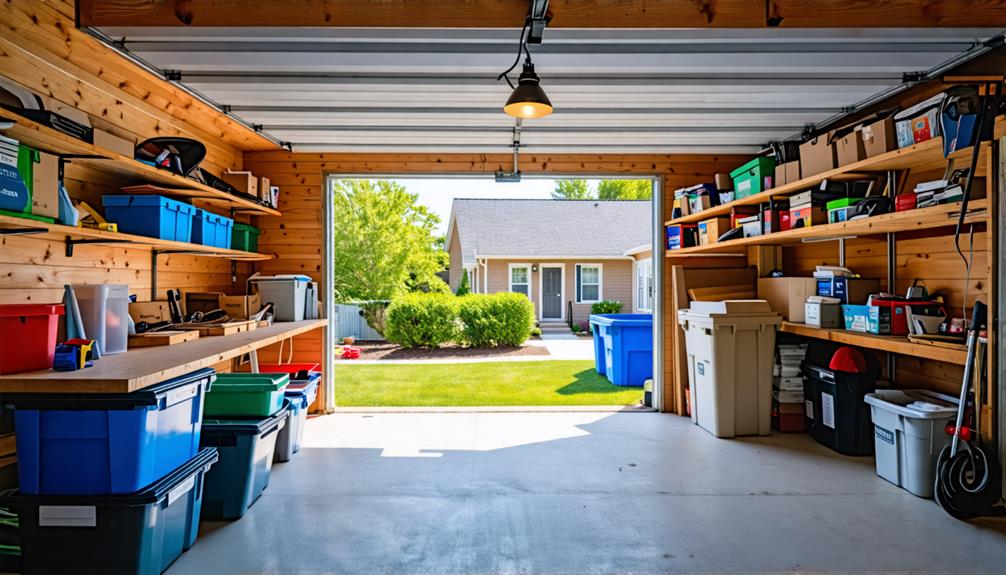Renting out your garage as storage space involves converting the unused area into a secure and accessible space for renters to store their belongings. To implement this side hustle, start by assessing your garage's condition and making any necessary repairs or modifications to ensure it's suitable for storage.
Determine your target market, such as neighbors, local businesses, or students, and research the competition to set a competitive pricing structure. You can advertise your storage space on local classifieds, social media, or websites specializing in peer-to-peer storage rentals.
Before renting out your garage, consider the following essential factors:
- Insurance: Verify your homeowner's insurance policy to see if it covers storage rental, and consider obtaining additional coverage if necessary.
- Security: Install sturdy doors, locks, and potentially security cameras to safeguard renters' belongings and your property.
- Access: Define access terms, such as key exchange, entry codes, or designated access times, to ensure smooth and secure access for renters.
- Lease agreement: Create a comprehensive lease agreement outlining terms, payment, and expectations for both parties.
- Local regulations: Familiarize yourself with local zoning laws, permits, and regulations regarding storage rentals to avoid potential fines or issues.
By understanding these factors and implementing a clear plan, you can successfully rent out your garage as storage space, generating additional income while providing a valuable service to your community.
Key Takeaways
- Declutter and inspect the garage to ensure it's secure, well-maintained, and suitable for storage rentals.
- Conduct market research to determine local demand, competition, and pricing trends for garage storage rentals.
- Create a comprehensive rental agreement that outlines terms, conditions, and liabilities to protect both you and your tenants.
- Implement security measures, such as sturdy locks and alarm systems, to protect the stored items and your property.
Prepare Your Garage for Rent
Transforming your garage into a rentable storage space requires thorough preparation to make it attractive to potential clients.
Removing unnecessary items like broken appliances, old furniture, and trash is crucial. Categorize items into keep, donate/sell, and discard piles, and be strict about what to keep to optimize the space for rent.
Inspect the garage for damage or needed repairs, addressing any water damage, structural issues, or pest infestations to ensure the space is safe and secure.
Install shelving units, hooks, and storage containers to help potential renters envision efficient use of the space. A secure locking system and adequate lighting can also enhance the garage's appeal.
Determine Your Target Rental Market
To optimize your garage storage rental side hustle, identifying your ideal customer is crucial. Consider factors like location, competition, and in-demand storage services. Conduct a demographic analysis to understand potential customers' characteristics, such as age, income, and lifestyle. This information will help you create targeted marketing campaigns and tailor services to meet specific needs.
Market segmentation is also vital in determining your target rental market. Segment your market based on factors like:
- Type of storage needed (e.g., furniture, vehicles, equipment)
- Rental period length (e.g., short-term, long-term)
- Location (e.g., urban, suburban, rural)
- Customer type (e.g., individuals, businesses, students)
Set a Competitive Rental Price
To set a competitive rental price for your garage storage space, you'll need to research local market rates to understand what renters are willing to pay.
You'll also need to calculate the value of your storage space, considering factors such as its size, security, and accessibility.
Research Local Market Rates
Researching local market rates is crucial to setting a competitive rental price for your garage storage space.
Understanding local demand and pricing trends helps determine the ideal rental price to attract tenants and maximize earnings. Analyze rates charged by nearby storage facilities, considering factors such as storage capacity, security features, and accessibility.
Local demand should be assessed by considering population density, student populations, and military bases. Pricing trends, including seasonal fluctuations, should be identified.
Competition from existing storage facilities should be researched, noting their prices, amenities, and occupancy rates. Value-added features, such as climate control, security cameras, or 24-hour access, should be considered.
Local zoning laws and regulations governing storage facilities must be understood.
Calculate Storage Space Value
Calculating the storage space value of your garage for rental purposes involves dividing the total square footage into separate sections or units. Research local market rates to assign a price per square foot.
Take precise measurements of your garage's length, width, and any obstructions that reduce usable storage space. Subdivide the space into standard storage unit sizes, such as 5×5 feet or 10×15 feet.
Determine the total available storage units in your garage based on these measurements and comparisons. Apply the rental price per square foot from your research to each standard storage unit to find the total storage value of each unit.
This allows for competitive comparisons and pricing adaptability within the local rental market for garage storage services. The calculated per-unit rental prices provide guidance for deciding on ideal rental pricing terms for clients, enabling strategic response to fluctuating seasonal market conditions.
Choose Pricing Strategy Wisely
Choosing a pricing strategy for your garage storage rental side hustle requires a balance between maximizing revenue and attracting a steady stream of clients in a crowded local market.
To set a competitive price, evaluate the going rate for similar storage spaces in your area, the level of demand, and the unique features of your garage.
When determining your pricing, factor in pricing psychology and discount strategies to make your offer more appealing. Research local competition to understand what others are charging for similar storage spaces.
Calculate costs, including expenses like utilities, maintenance, and insurance, to ensure you're making a profit.
Consider a tiered pricing system, offering discounted rates for longer-term rentals or for smaller storage spaces. Highlight unique features, such as climate control or security cameras, and price accordingly.
Be flexible and open to negotiating prices or offering discounts to fill vacancies quickly.
Create a Rental Agreement Contract
Drafting a thorough rental agreement contract is crucial to establishing the terms and conditions of the rental property, protecting your interests as a landlord, and outlining the responsibilities of both parties.
You'll want to take into account various legal considerations, such as the length of the rental period, payment terms, and liability for damages. Clearly outline the tenant responsibilities, including maintaining the property, reporting any damage or issues, and adhering to access and use restrictions.
Your contract should also address security deposits, termination clauses, and dispute resolution processes. Be sure to research local laws and regulations regarding rental properties to guarantee your contract complies with all requirements.
Having a detailed contract in place will help prevent misunderstandings and protect you in case of disputes. It's a good idea to have a lawyer review your contract before finalizing it.
Establish Clear House Rules
As you prepare to rent out your garage as storage space, you'll need to establish clear house rules to guarantee a smooth and respectful arrangement.
You'll want to set boundaries around what can and can't be stored, as well as define access restrictions to maintain control over your property.
Setting Boundaries
Establishing clear boundaries with clients is essential for a successful side hustle renting out your garage.
Set clear expectations and guidelines for usage, noise levels, and maintenance responsibilities to protect your property and ensure a smooth rental experience.
When setting boundaries, consider the following:
- Client access and usage restrictions: Specify what can and can't be stored in the garage and rules regarding access.
- Scheduling and quiet hours: Set specific hours for client access and quiet hours to maintain a peaceful environment.
- Maintenance and upkeep: Clearly outline client responsibilities for maintaining the garage, including cleaning and minor repairs.
- Guest policies: Determine if clients are allowed to have guests on the premises and under what circumstances.
Access Restrictions
Setting boundaries with clients in your side hustle is crucial, and access restrictions play a significant role in this.
Clearly define what areas of your workspace are off-limits, what activities are permitted or prohibited, and what expectations you have for their use of the space. To achieve this, implement effective access control measures, such as locks, gates, or keycard systems, to regulate who can enter and when. This protects your property and maintains client confidentiality.
Communicate these access restrictions to clients through a written agreement or verbal discussion to avoid misunderstandings. Specify quiet hours, prohibited activities, or off-limits areas, such as storage or personal workspaces.
Establishing boundaries maintains a respectful environment for you and your clients. Regularly review and update access restrictions to ensure a smooth and secure experience for everyone involved.
Payment Terms
Clear payment terms are crucial when monetizing your garage as a storage space. Specify accepted payment methods, such as bank transfers or online platforms, and whether a security deposit is required. Define the payment schedule, including due dates and late fees for missed payments.
Consider the following when setting payment terms:
- Outline payment amounts and frequency (e.g., monthly, quarterly).
- Specify accepted payment methods and associated fees.
- Define late fees and penalties for missed payments.
- Establish a process for resolving payment disputes.
Add Security Measures for Tenants
To safeguard tenants' possessions in your rented storage space, implement robust security measures such as installing motion-sensitive outdoor lights, sturdy locks, and a reliable alarm system.
Consider investing in a smart door lock that can be controlled remotely and monitored for any suspicious activity.
Conduct thorough tenant screening, including verifying identity, checking rental history, and running background checks, to minimize potential security risks.
Clearly outline security protocols and expectations in the rental agreement to ensure tenants understand their responsibilities in maintaining a secure storage space.
Invest in Liability Insurance
Investing in liability insurance is crucial when renting out your garage as storage space. This type of coverage protects you and your assets from potential risks and lawsuits. If a tenant suffers an injury or property damage while using your garage, liability insurance helps cover financial losses.
To choose the right policy, assess your garage rental space's risks.
Consider the following factors:
- Type of items being stored, such as hazardous materials or valuable equipment
- Number of tenants, as multiple renters increase the risk of accidents or disputes
- Garage conditions, including potential hazards like uneven flooring or inadequate lighting
- Local regulations regarding insurance requirements for garage rental spaces
Market Your Garage Rental Space
Market your garage rental space to attract potential tenants by leveraging online listings, social media promotion, and word-of-mouth referrals. Online listings on websites like Craigslist and Facebook Marketplace can help reach a wider audience. You can also post about your rental space on your personal social media accounts, including photos of the space, to generate interest.
Garage Rental Space Marketing Options
| Marketing Channel | Description | Cost |
|---|---|---|
| Online Listings | Advertise your garage rental space on popular websites | $0 – $50/month |
| Social Media Promotion | Share your rental space on personal social media accounts | $0 |
| Local Referrals | Encourage current tenants to refer friends and family | $0 |
| Neighborhood Flyers | Distribute printed materials to advertise your rental space in the local area | $50 – $100 |
Select a combination of these options that fit your marketing budget to effectively promote your garage rental space.
Handle Inquiries and Viewings
Handling inquiries and viewings for your garage rental side hustle requires a structured approach to ensure efficiency, safety, and finding the right tenant. Respond to inquiries promptly and professionally to create a good impression and filter out unsuitable renters.
When scheduling viewings, consider the following best practices:
- Prepare a standard set of questions for potential tenants, including their storage needs, rental history, and expectations.
- Establish clear boundaries and viewing etiquette, such as requiring a minimum of 24 hours' notice.
- Have all necessary documents and information ready, including rental agreements, payment terms, and garage space details.
- Conduct viewings during daylight hours when possible to ensure a safe and secure environment.
Conclusion
Transforming your garage into a storage space for rent can be a lucrative venture, connecting individuals with limited space to a convenient and accessible solution.
By filling this gap in the storage market, you can establish a steady stream of passive income, similar to hosts on Airbnb who've created a new paradigm in accommodation rentals.
Garage owners are already capitalizing on this trend, with some securing up to $200 every month.

















































0
View comments